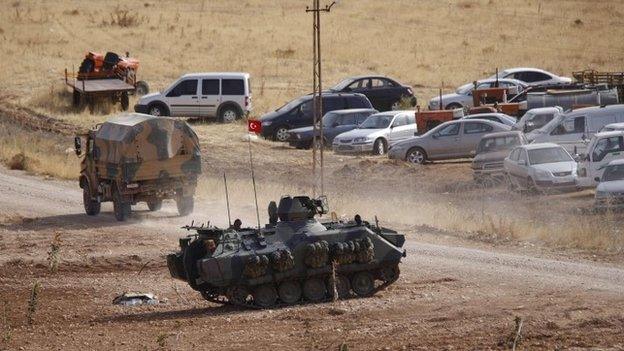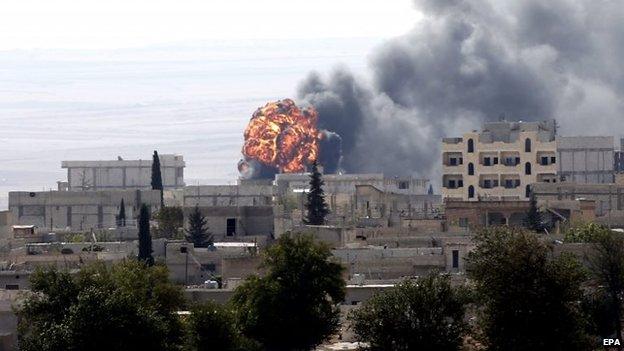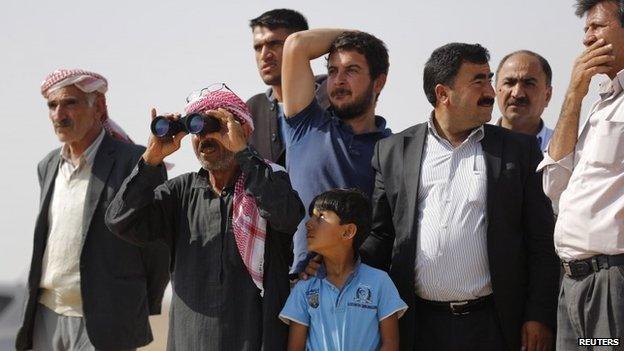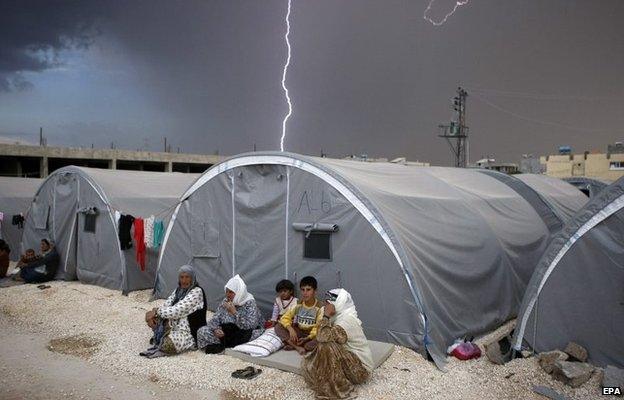Islamic State steps up attack on Syrian town of Kobane
- Published
Paul Adams witnessed some of the shelling near Kobane
Intense fighting has flared between Kurdish militiamen and Islamic State (IS) militants advancing on the northern Syrian town of Kobane.
A BBC correspondent across the border in Turkey said mortars struck Kobane's eastern outskirts and there was heavy machine-gun and small arms fire.
IS has moved to within 1km (0.6 miles) of the town despite air strikes seeking to halt its two-week offensive.
Turkey has promised it will do whatever it can to prevent the fall of Kobane.
Prime Minister Ahmet Davutoglu made the vow on Thursday after the Turkish parliament authorised military operations against militants in Iraq and Syria, as well as the use of Turkish bases by foreign forces.
A US-led international coalition is carrying out air strikes against IS positions in Iraq and Syria.
More than 160,000 Syrians, mainly Kurds, have fled across the border since IS launched an offensive to capture Kobane on 15 September.
In a separate development, IS militants shot down a government helicopter in the Baiji area north of the Iraqi capital Baghdad, defence officials said.


Turkish tanks and armoured vehicles have been deployed along the Syrian border
Paul Adams, BBC News, Syrian-Turkish border near Kobane
Turkey's prime minister seemed to give a categorical assurance. The Turkish government, Mr Davutoglu said, did not want Kobane to fall and would do whatever it could to prevent this from happening.
But here on the border, Kobane is still under attack. A few hundred metres away, a squadron of Turkish tanks sits idle. There are no signs of any imminent Turkish move to stop the town falling.
Despite Thursday's parliamentary decision, Turkey is still wary of getting involved. It seems likely the government will once again press members of the US-led coalition to create a no-fly zone before sending troops anywhere across the border.

'World remains silent'
Shells fired by IS fighters hit several buildings inside Kobane and Kurdish militia positions on a strategically important hill overlooking the town on Friday morning.
The fighting became more intense in the afternoon, with regular mortar fire hitting the eastern edge of the town and explosions to the south-west, reports the BBC's Paul Adams, who is on the Turkish side of the border.
Taken together, it feels like the most sustained attack on Kobane so far, our correspondent adds.
Earlier, there were unconfirmed reports that IS had entered Kobane. Alan Minbic, a member of the Kurdish Popular Protection Units (YPG), told CNN, external that the jihadists had taken control of the Tal Shair area, in the south-west corner of the town.

Mortars fired by IS fighters struck buildings inside Kobane on Friday

Crowds of Kurds have joined the media on the hill opposite the town to watch the battle

Turkey is hosting tens of thousands of refugees from Kobane

Capturing the town, also known as Ayn al-Arab, would give IS unbroken control of a long stretch of the Syrian-Turkish border.
Late on Thursday, Mr Davutoglu said: "We wouldn't want Kobane to fall. We'll do whatever we can to prevent this from happening.
"No other country has the capacity to affect the developments in Syria and Iraq. No other country will be affected like us either."
However, Defence Minister Ismet Yilmaz subsequently said any immediate move was unlikely.
The Syrian government also said any military intervention by Turkey would be regarded as an act of aggression.
Turkish Kurds have expressed anger and disappointment at their government's perceived inaction over IS in recent months, as well as its refusal to allow them to cross into Syria to fight.
"There is a massacre being committed before the eyes of the world. The world remains silent when Kurds are being massacred," Burhan Atmaca, who travelled to the Mursitpinar border crossing to show solidarity with the Kurdish fighters, told the AFP news agency on Friday.
Meanwhile, the Pentagon said fighter jets from Saudi Arabia and the United Arab Emirates joined US warplanes in fresh bombing raids against IS in Syria on Friday.
It said coalition planes hit tanks, oil refineries and a militant training camp and US aircraft also conducted three air raids in Iraq.
Also on Friday, Australia's cabinet gave its approval for its aircraft to begin flying combat missions in Iraq.
The Canadian government also said it would contribute military assets to the US-led coalition against IS, "including air strike capability", but would not deploy troops in ground combat operations.

In 60 seconds: What does Islamic State want?
Formed out of al-Qaeda in Iraq (AQI) in 2013, IS first captured Raqqa in eastern Syria
It captured parts of Iraq in June, including Mosul, and declared a "caliphate" in areas it controls in Syria and Iraq
Pursuing an extreme form of Sunni Islam, IS has persecuted non-Muslims such as Yazidis and Christians, as well as Shia Muslims, whom it regards as heretics
Known for its brutal tactics, including beheadings of soldiers, Western journalists and aid workers
The CIA says the group could have as many as 31,000 fighters in Iraq and Syria